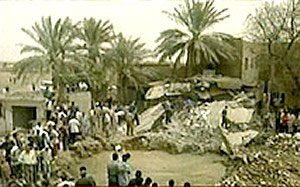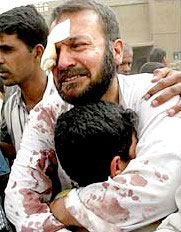"The explosion caused the destruction of the cache as well as a nearby building," the statement said. The incident was a reminder that dangers persist in Baghdad, even though fighting has all but ended and the United States has begun focusing on postwar challenges. Secretary of Defense Donald H. Rumsfeld embarked Saturday on a trip to the Persian Gulf region - the exact itinerary was not disclosed for security reasons. Rumsfeld has said he wants to talk to leaders of friendly countries in the area about possible reduction in the U.S. military presence now that Saddam Hussein's regime is no longer. The ordnance that exploded in Baghdad was stored in a large field surrounded by high walls in Zafaraniyah and, according to Lt. Herb Josey at Central Command, had been used by Saddam's regime. He would not say if U.S. forces had added weapons to the existing depot. Ammunition at the dump was still exploding Saturday afternoon, setting off large blasts, whistling rockets and rounds going off from the heat. A highway outside the dump was littered for hundreds of yards with grenades, shrapnel, bullets and rocket mortars. Five people were admitted to the Zafaraniyah General Hospital in serious condition, said Dr. Mohammed Abdel Rahman Mahmood. About 20 others were treated at the hospital for minor injuries and released, hospital officials said. The U.S. military said the wounded American was hurt in the initial attack on the depot, not the subsequent explosions. The soldier suffered a broken arm, said Col. John Peabody, commanding officer of U.S. Army's 11th Engineering Brigade His name was being withheld pending notification of relatives. An open bed truck loaded with six coffins carrying victims drove through Zafaraniyah. Men stood around the coffins and chanted, "Down with America!" At one point, the coffins were brought to the victims' home, where crowds shouted anti-U.S. slogans and women ululated. When the coffins were carried out for burials, women collapsed on them. The smell of sewage permeated the air after sewer lines broke. A deep crater in the road filled up with the dirty water. Hundreds of people in private vehicles began evacuating the neighborhood at the behest of U.S. soldiers. Many chanted angrily and waved their fists at the troops: "America's no better than Saddam," some chanted. "This is the responsibility of the U.S. Army because we told them this is a civilian area," one man said from a beat-up white car. Angry residents denounced the U.S. military for storing ammunition at the depot. Families said they had gone to American officers repeatedly to ask the military to stop controlled explosions at the dump that had been conducted in recent days. In remarks to Abu Dhabi Television, seen widely throughout the Arab world, Waleed al-Haliy, secretary general of a newly constituted Iraqi human rights organization, said as occupiers, the Americans should be held responsible for the explosions. He called for an international investigation "This is the request of the Iraqi people who continue to suffer from Saddam's weapons that are scattered around residential areas," he added. Peabody said the site held 80 missiles, including Iraq's al-Samud 2s and others made in Russia. Attackers threw or launched four incendiary devices, setting off the explosions, Peabody said. Experts had certified it was "stored in a safe manner. Were it not for the fact that it was attacked, we would not have any casualties whatsoever," he said. Army Spc. Kevin Braam said the dump stored both Iraqi and U.S. ammunition. "I don't know if it was a civilian upset at us or if a militia may have caused it, but we're not the ones," he said. Elsewhere in Iraq, a U.S. Marine officer said the peaceful departure of a Shiite Muslim cleric who had occupied the city hall in the city of Kut should reduce tension there. The cleric, Said Abbas, left the city hall Friday evening after Marines delivered a letter demanding his departure. The Marines had threatened to arrest him on charges of theft and destruction of property if he failed to comply. Backed by dozens of armed bodyguards, Abbas took over the city hall and claimed control of Kut more than a week ago. His followers had been protesting the presence of U.S. troops. The people of Kut "can feel a bit more secure knowing Abbas is not trying to take charge of the town, where he never had authority to do so," said Col. Ron Johnson. Marines say Abbas is a member of the Iran-based Supreme Council of the Islamic Revolution - the largest Shiite Muslim opposition group. The council's leaders have called for an end to the U.S. presence in Iraq and are lobbying for an Islamic government. In another sign of returning normalcy in Kut, 100 schools reopened Saturday for the first time since the war, Johnson said. Marines had earlier cleared weapons from the schools, where they had been hidden by fighters loyal to Saddam. In Baghdad, teachers reported to work in some schools but found no students to instruct as security concerns persisted and administrators awaited orders from a government that doesn't yet exist. "People won't send their children to school without hearing some kind of instruction in the media," said Abdul Zahra Fadel, assistant headmaster at the Mohammed Dura Middle School. With no television or newspapers, that is a tall task. Iraq also has no operating Education Ministry to order classes resumed. But Baghdad slowly was regaining power. Brig. Gen. Steve Hawkins, commander of Task Force Fajr, or Dawn, said 75 percent of the eastern side of the city had power as of Saturday, and 25 percent of the western side. He said 65 percent to 70 percent of Baghdad had water and all the water pumping stations were working. Of the city's 12 public hospitals, 11 had water and power. All 26 sewage plants had power.
|

